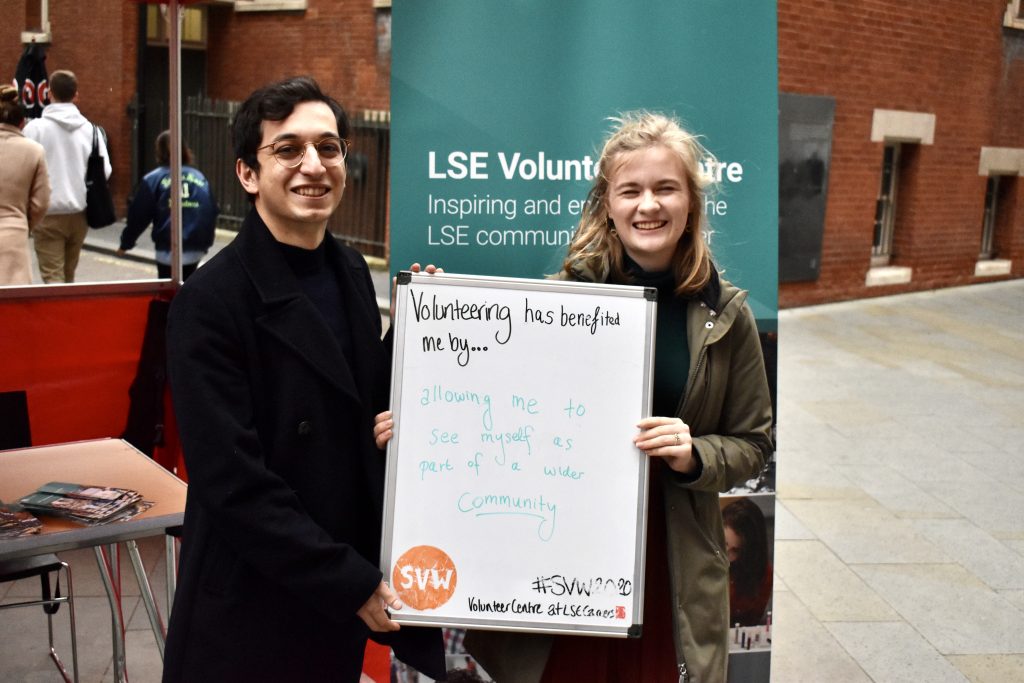We’ve just released the results of our annual student volunteering survey. 525 students responded, giving us insights in to all of their volunteering activities. We put students at the heart of everything we do in the Volunteer Centre so listening to their opinions is crucial to making improvements.
So what what did we learn? How are students benefitting from volunteering? When are they doing it? And how can we inspire more to take part?
1. LSE students are dedicated
This isn’t a surprise, but the amount of volunteering that happens is quite incredible. For example almost 60% of our third year undergraduates volunteered whilst at LSE. And although we offer a comprehensive one-off volunteering programme the vast majority of student volunteers are involved with ongoing opportunities. Over 60% of those that volunteer do it at least once a month and almost 37% volunteer at least once a week. Passion for many causes runs deep amongst our students.
A new question that we added this year was asking if students have volunteered to help those directly affected by COVID-19. 10% of students who said they volunteered had done an activity related to this. Considering this survey was sent in April, just before exams started, we were incredibly impressed with this figure.
2. Altruism is the top motivator
There is a common myth that young people only volunteer to benefit themselves and to further their careers. Those that work with young volunteers know this isn’t the case, their motivations are nuanced and broad. The top three motivators for LSE student volunteers are:
- to improve things
- give back to society
- because it fits in with their personal values
Developing CVs and gaining work experience is important, and there’s nothing wrong with that, but there are many factors at play.
3. Volunteering affects all areas of the LSE experience
The headline figure is that over 70% of students who volunteer say it improves their LSE experience. But we ask several supplementary questions about three more specific areas which volunteering has a big impact on:
Personal life
Over half of those that volunteer say their range of friendships has increased, 50% say their general well-being has increased, over 40% say their sense of being part of the university has increased and 66% say their sense of feeling part of their local community has increased. In a big city like London it can be difficult for some to make friends and feel like they are part of a community. Volunteering plays a unique role in giving people a stake in society, ownership of issues they care about and is a way to break down barriers.
Education, learning and confidence
Over 25% of those that volunteer say knowledge of their degree subject increased. Almost 75% say their understanding of other people has increased and 64% feel their confidence in their own abilities has increased. Volunteering acts as a crucial bridge between classroom learning and real life experiences putting those theories in to practice.
Future career prospects
Students report that communication, organisational, decision-making, and team-working skills all improve as a result of volunteering. They are also more willing to try new things and 55% feel the skills they think employers are looking for have improved. All of these results indicate volunteering helps create well-rounded individuals ready to start their careers once they leave LSE.
“I think that the volunteers that come from LSE are sensible, reliable, and they are genuinely interested in what they are here to do. I think some of this must come from the ethics that LSE gives its students along with the skills that the students provide.” Volunteer Centre charity partner.
4. We have excellent charity partners
The LSE Volunteer Centre only provides the spark to start volunteering. Our role is to connect students and charities. A crucial part of whether volunteering is a success for our students revolves around good experiences from the organisations we work with. 94% of students who volunteer say they would recommend it to a friend so we’re confident in what our partners are doing and their ability to manage student volunteers. We work with over 300 charities per year and we want to say a massive thank you to all of them.
5. We can reach more students
Despite the above we know that there is more to do. Out of those students that haven’t volunteered since joining LSE over 50% have considered it and 79% have volunteered before arriving at the School. The biggest barrier to volunteering is time pressure due to study. For that reason we’ll continue to expand our one-off volunteering programme. We are also looking forward to rolling our a number of new programmes this year to help students engage.
If you’re not currently volunteering because you’re not sure how to get involved the following can help:
- visit our website to learn more about what we do
- book a one-to-one appointment to discuss how we can help you find a suitable role
- browse one-off and ongoing opportunities on CareerHub
Volunteering has the potential to transform a university experience for LSE students and we look forward to inspiring many more to get involved in the upcoming academic year.
If you work with young volunteers, does our analysis match what they tell you? Get in touch and add to the debate on social media.








1 Comments